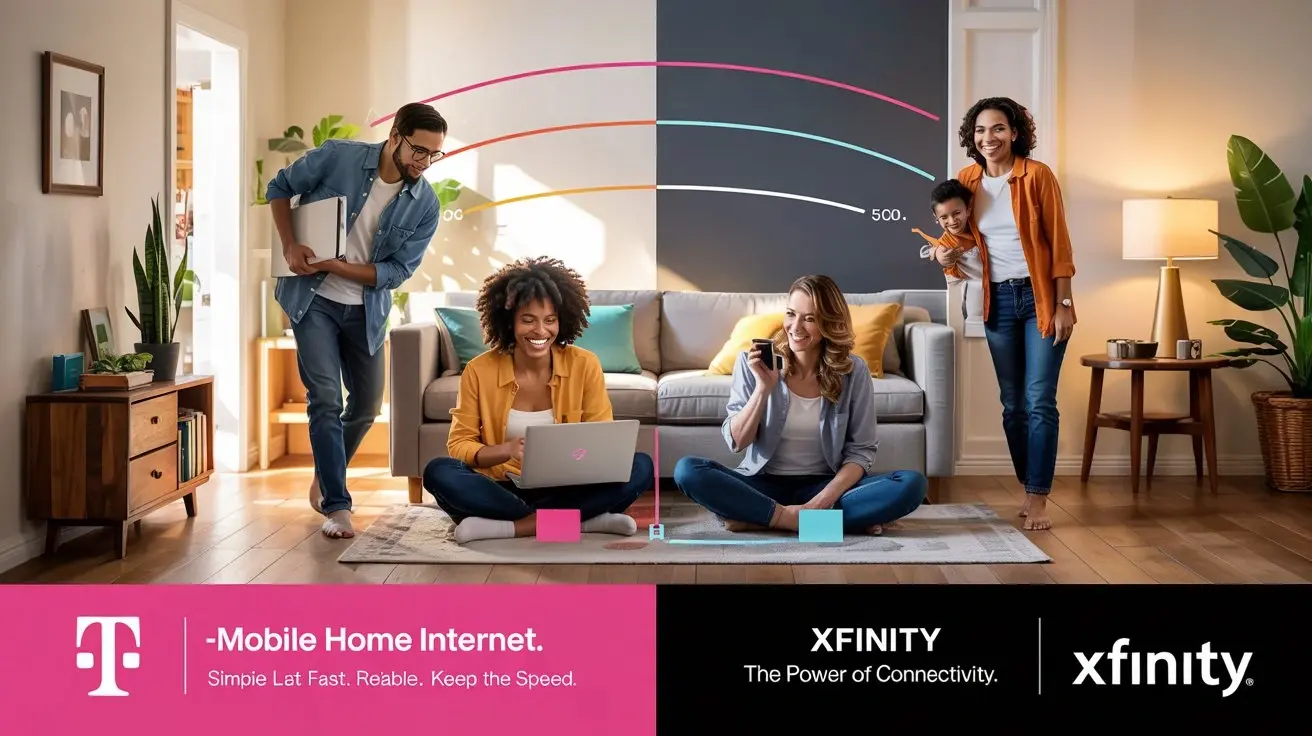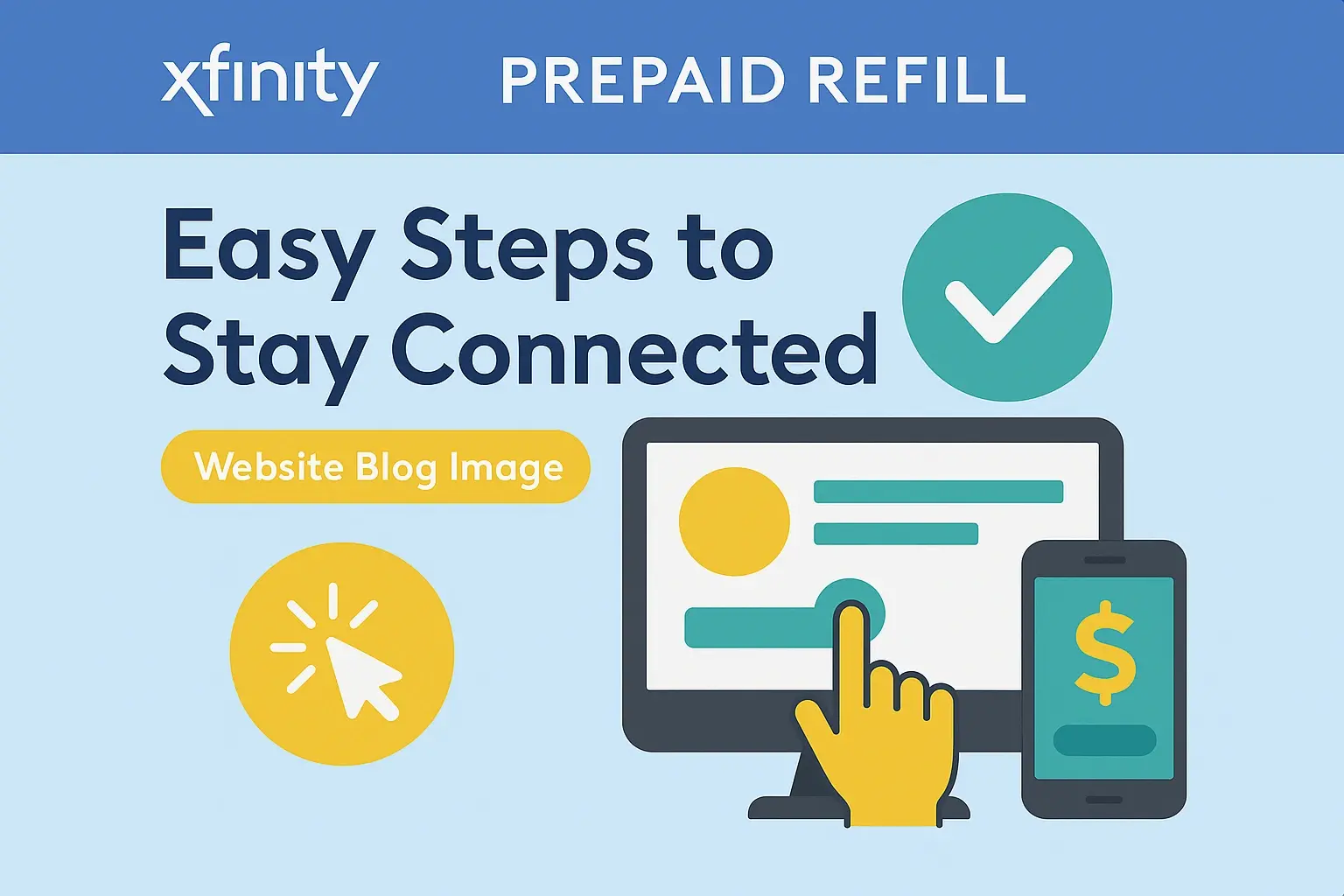T-Mobile Home Internet vs. Xfinity: Which ISP is Right for You?

In today’s digital age, a reliable internet connection is essential for everything from streaming movies to remote work. T-Mobile Home Internet and Xfinity are two leading ISPs vying for your subscription, each offering distinct advantages. T-Mobile leverages its 5G network to deliver wireless home internet, while Xfinity relies on a robust cable and fiber infrastructure. This blog dives deep into their offerings, comparing speeds, pricing, reliability, and more to help you make an informed choice.
T-Mobile Home Internet vs Xfinity: Speed and Performance
T-Mobile Home Internet
T-Mobile’s 5G Home Internet service uses its nationwide 5G network to provide wireless connectivity. Speeds typically range from 72 to 245 Mbps for downloads, with upload speeds between 15 and 31 Mbps. These speeds are sufficient for most households, supporting streaming, video calls, and light gaming. However, performance can vary based on your location, signal strength, and network congestion. Since it’s wireless, there’s no need for extensive installation, making it ideal for renters or those in areas without robust cable infrastructure.
Xfinity
Xfinity, a Comcast brand, offers cable and fiber internet with a broader range of speed tiers, from 150 Mbps to an impressive 10 Gbps in select areas. For most users, plans like the 300 Mbps or 600 Mbps options provide ample speed for multiple devices, heavy streaming, and gaming. Xfinity’s fiber plans are particularly appealing for households with high-bandwidth needs, offering symmetrical upload and download speeds. However, the Xfinity availability of fiber plans is limited, and cable speeds can slow down during peak usage times due to shared bandwidth.
Verdict: Xfinity generally offers faster and more consistent speeds, especially for power users, but T-Mobile’s 5G service is competitive for moderate internet needs, particularly in areas with strong 5G coverage.
T-Mobile Home Internet vs Xfinity: Pricing and Plans
T-Mobile Home Internet
One of T-Mobile’s biggest selling points is its straightforward pricing. The standard plan costs $60 per month with autopay, and customers with T-Mobile wireless plans may qualify for a $20 discount, bringing the cost to $40 per month. This price includes all taxes, fees, and equipment rental, with no contracts or data caps. The flat-rate pricing makes budgeting easier, and the lack of hidden fees is a significant advantage.
Xfinity
Xfinity’s pricing varies by region and plan, with introductory rates starting as low as $25–$35 per month for basic plans (e.g., 150 Mbps). Higher-tier plans, such as 600 Mbps or 1 Gbps, range from $50 to $80 monthly during promotional periods. However, these rates often increase after 12–24 months, and additional fees for equipment rental, installation, or data overages (in some plans) can add up. Xfinity also requires contracts for the best rates, which may deter those seeking flexibility.
Verdict: T-Mobile’s pricing is more transparent and budget-friendly, especially for those eligible for discounts. Xfinity’s introductory rates are competitive, but long-term costs and fees can make it pricier.
Reliability and Coverage
T-Mobile Home Internet
T-Mobile’s 5G Home Internet relies on cellular towers, so reliability depends on your proximity to a tower and signal strength. Urban and suburban areas with strong 5G coverage typically experience stable connections, but rural users may face inconsistent speeds or connectivity issues. Some users report compatibility issues with specific devices, like certain printers, due to the wireless setup. Additionally, network prioritization may affect performance during peak times, as T-Mobile prioritizes mobile users over home internet.
Xfinity
Xfinity’s cable and fiber networks are generally more reliable, with fewer fluctuations in speed. However, cable internet can suffer from congestion during peak hours, especially in densely populated areas. Fiber connections, where available, offer superior reliability and symmetrical speeds. Some customers have reported frequent outages and poor customer service experiences, which can impact overall satisfaction.
Verdict: Xfinity’s wired infrastructure provides more consistent reliability, but T-Mobile’s wireless service is a solid alternative in areas with strong 5G signals.
Installation and Equipment
T-Mobile Home Internet
T-Mobile’s setup is user-friendly, requiring only a 5G gateway device that you plug in and connect to Wi-Fi. There’s no professional installation needed, and the gateway is included in the monthly price. T-Mobile is a great option for those who want a hassle-free setup or who frequently move. However, optimal placement of the gateway is crucial for maximizing signal strength.
Xfinity
Xfinity typically requires professional installation, which may cost $40–$100 unless waived during promotions. Customers can opt for self-installation in some cases, but this still involves connecting a modem and router. Equipment rental fees ($15/month) apply unless you purchase your own compatible modem. Xfinity’s xFi Gateway offers advanced features like parental controls and Wi-Fi management, but the additional cost can be a drawback.
Verdict: T-Mobile wins for simplicity and cost savings on installation and equipment, while Xfinity’s setup is more involved but offers advanced router features.
Customer Service and Support
T-Mobile Home Internet
T-Mobile is known for its customer-friendly approach, with 24/7 support via phone, app, or online chat. The company’s transparent pricing and no-contract policy contribute to positive customer sentiment. However, troubleshooting 5G connectivity issues can be challenging, as they often depend on network conditions rather than in-home equipment.
Xfinity
Xfinity’s customer service has mixed reviews. While some users appreciate the availability of local service centers, others report long wait times and unhelpful support. Outages and billing disputes are common complaints which can frustrate users seeking quick resolutions.
Verdict: T-Mobile generally has a better reputation for customer service, though both providers have room for improvement.
Additional Features and Perks
T-Mobile Home Internet
T-Mobile offers perks like a 15-day risk-free trial, allowing you to test the service. It also includes free streaming benefits for eligible customers, such as Netflix or Apple TV+ with certain plans. The lack of data caps is a significant advantage for heavy internet users.
Xfinity
Xfinity bundles internet with TV, phone, or home security services, which can be cost-effective for those seeking multiple services. The xFi Gateway provides robust Wi-Fi coverage and app-based controls. However, data caps (1.2 TB/month) apply to some plans, with overage fees for exceeding the limit.
Verdict: T-Mobile’s no-data-cap policy and streaming perks are appealing, while Xfinity’s bundling options suit those wanting a comprehensive home service package.
Who Should Choose Which?
Choose T-Mobile Home Internet if:
You live in an area with strong 5G coverage.
You prefer simple, transparent pricing with no contracts.
You want a hassle-free, wireless setup.
You’re a light-to-moderate internet user who streams or works from home.
Choose Xfinity if:
You need high-speed plans for gaming, 4K streaming, or multiple devices.
You have access to Xfinity’s fiber network.
You want to bundle internet with TV or phone services.
You prioritize consistent, wired reliability over wireless flexibility.
Conclusion
Both T-Mobile Home Internet and Xfinity offer compelling options, but the best choice depends on your needs and location. T-Mobile’s 5G Home Internet shines for its affordability, simplicity, and no-contract flexibility, making it ideal for renters or those in 5 G-covered areas. Xfinity, with its faster speeds and broader plan options, is better suited for power users or those seeking bundled services, though it comes with higher costs and potential fees. Evaluate your internet usage, budget, and local coverage to decide which ISP will keep you connected seamlessly.
Call (855) 210-8883 to choose the best internet provider for you.





